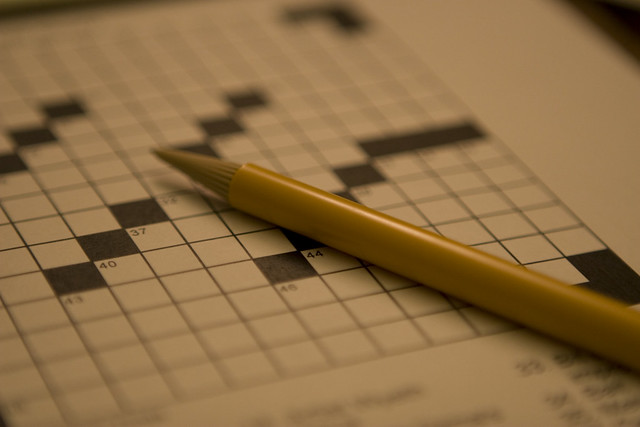
I first experienced ennui while solving a crossword puzzle — no, not the actual feeling of listlessness or dissatisfaction; rather, that’s when I first encountered the word. My adventures in a new tongue had begun, a strange language called Crosswordese, which consists of words used often by crossword makers but rarely experienced in the real world. (By the way, in Crosswordese, a crossword maker is known as a cruciverbalist.)
Do you speak Crosswordese? When you lose a button from a shirt and can’t find the sewing kit, do you ask your partner where the etui is kept? Might you sometimes mischievously refer to margarine as oleo? Have you ever stridden into a church just to point out what a great apse it has?
 I started a life of crossword-solving as a teenager, almost three decades before my first novel, Black Chalk, was published, and I give credit to the world of puzzles for helping foster my interest in language.
I started a life of crossword-solving as a teenager, almost three decades before my first novel, Black Chalk, was published, and I give credit to the world of puzzles for helping foster my interest in language.
But crosswords are about more than accumulating words: crosswords are about having fun with words; crosswords are, in fact, about loving words.
Among my favorite crossword clues are the following (answers at the bottom of this piece in case you want to solve):
- HIJKLMNO? (5 letters)
- Site of unexpected change? (4 letters)
- Where there’s a Will? (12 letters)
See, crosswords encourage you to play with language. And, as a novelist, I get to play in the sandbox of words every day. But more than just aiding in a love of language, more than just encouraging you to have fun with words, crosswords also stimulate skills such as lateral thinking, humor, and synonym use. You could say that crosswords are the ideal training tool for a novelist.
But the ways in which puzzles have affected my life as a novelist go deeper than the mere enjoyment of solving crosswords. In my early 20s, having discovered that I absolutely loathed Law (the subject of my college degree and subsequent training, and the area in which my parents wished me to work), I needed to find a job. I had known for some time that I wanted to be a novelist, but at that tender age I think I felt too young to write fiction. (And I know I felt considerably too scared.) So instead of turning to novels right away, I got a job in another area I loved: puzzles. And for years, I edited and compiled all sorts of puzzles — crosswords, logic problems, word searches, sudoku, riddles, spot the difference…How could all of this fail to leach into my fiction?
If Black Chalk reads like a puzzle (and many reviewers have stated as much) then it is as much because of my work in that field as it is because I enjoy challenging myself — I really do like tormenting myself with plot problems, it seems. As a writer you sit on your own in a small room for a very long time — and one of the ways I like to keep myself entertained, it turns out, is by constantly pivoting and twisting my plots like the pieces of a Rubik’s Cube until I come across a pattern I find particularly pleasing.
It feels to me that staring at the blank page is a lot like staring at a blank crossword grid. When I make up a crossword, I have, say, a theme and 10 or a dozen answers that I want to place in the grid. And when I set out to write a novel, I have a theme and 10 or a dozen plot points or developments that I want to place in the story. And so the challenge, in both cases, becomes one of getting everything to interlock, of making everything work together, a matter of filling in the gaps in the most pleasing way possible.
Because, let’s face it, what better way is there than solving puzzles to stave off the feeling of…I’m stumbling for the right word here…It’s something like boredom…Dammit, I’m supposed to be good at synonyms…Ah, that’s it: ennui.
⅄∀M∀H⊥∀H ƎNN∀ ؛∀ℲOS ؛(¡O oʇ\ᄅ H) ᴚƎ⊥∀M :sɹǝʍsu∀
Image Credit: Flickr/Chip Griffin









